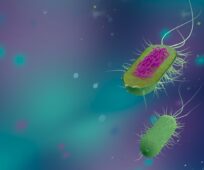 Prokaryotes are single-celled organisms that lack a nucleus and other membrane-bound organelles. They include bacteria and archaea, two of the three domains of life. Despite their small size and simple structure, prokaryotes play crucial roles in various ecological and biological processes. One of the most important functions of prokaryotes is their role in the cycling of nutrients in ecosystems. They are involved in the decomposition of organic matter, which releases essential nutrients back into the environment. These nutrients can then be used by plants and other organisms to grow and produce new organic matter. This process is critical for maintaining the balance of the ecosystem. Prokaryotes also play a significant role in the nitrogen cycle, which is crucial for the growth of plants and other organisms. Nitrogen is essential for the production of amino acids, nucleotides, and chlorophyll. Bacteria are able to convert atmospheric nitrogen into a form that can be used by plants, a process known as nitrogen fixation. In addition to their ecological functions, prokaryotes also have numerous applications in biotechnology and medicine. For example, they are used in the production of various fermented foods, such as yogurt and cheese. They are also used to produce enzymes and […] read more
Prokaryotes are single-celled organisms that lack a nucleus and other membrane-bound organelles. They include bacteria and archaea, two of the three domains of life. Despite their small size and simple structure, prokaryotes play crucial roles in various ecological and biological processes. One of the most important functions of prokaryotes is their role in the cycling of nutrients in ecosystems. They are involved in the decomposition of organic matter, which releases essential nutrients back into the environment. These nutrients can then be used by plants and other organisms to grow and produce new organic matter. This process is critical for maintaining the balance of the ecosystem. Prokaryotes also play a significant role in the nitrogen cycle, which is crucial for the growth of plants and other organisms. Nitrogen is essential for the production of amino acids, nucleotides, and chlorophyll. Bacteria are able to convert atmospheric nitrogen into a form that can be used by plants, a process known as nitrogen fixation. In addition to their ecological functions, prokaryotes also have numerous applications in biotechnology and medicine. For example, they are used in the production of various fermented foods, such as yogurt and cheese. They are also used to produce enzymes and […] read more
Last Updated:
June 4, 2025
What are Prokaryotes?
 Prokaryotes are single-celled organisms that lack a nucleus and other membrane-bound organelles. They include bacteria and archaea, two of the three domains of life. Despite their small size and simple structure, prokaryotes play crucial roles in various ecological and biological processes. One of the most important functions of prokaryotes is their role in the cycling of nutrients in ecosystems. They are involved in the decomposition of organic matter, which releases essential nutrients back into the environment. These nutrients can then be used by plants and other organisms to grow and produce new organic matter. This process is critical for maintaining the balance of the ecosystem. Prokaryotes also play a significant role in the nitrogen cycle, which is crucial for the growth of plants and other organisms. Nitrogen is essential for the production of amino acids, nucleotides, and chlorophyll. Bacteria are able to convert atmospheric nitrogen into a form that can be used by plants, a process known as nitrogen fixation. In addition to their ecological functions, prokaryotes also have numerous applications in biotechnology and medicine. For example, they are used in the production of various fermented foods, such as yogurt and cheese. They are also used to produce enzymes and […] read more
Prokaryotes are single-celled organisms that lack a nucleus and other membrane-bound organelles. They include bacteria and archaea, two of the three domains of life. Despite their small size and simple structure, prokaryotes play crucial roles in various ecological and biological processes. One of the most important functions of prokaryotes is their role in the cycling of nutrients in ecosystems. They are involved in the decomposition of organic matter, which releases essential nutrients back into the environment. These nutrients can then be used by plants and other organisms to grow and produce new organic matter. This process is critical for maintaining the balance of the ecosystem. Prokaryotes also play a significant role in the nitrogen cycle, which is crucial for the growth of plants and other organisms. Nitrogen is essential for the production of amino acids, nucleotides, and chlorophyll. Bacteria are able to convert atmospheric nitrogen into a form that can be used by plants, a process known as nitrogen fixation. In addition to their ecological functions, prokaryotes also have numerous applications in biotechnology and medicine. For example, they are used in the production of various fermented foods, such as yogurt and cheese. They are also used to produce enzymes and […] read more